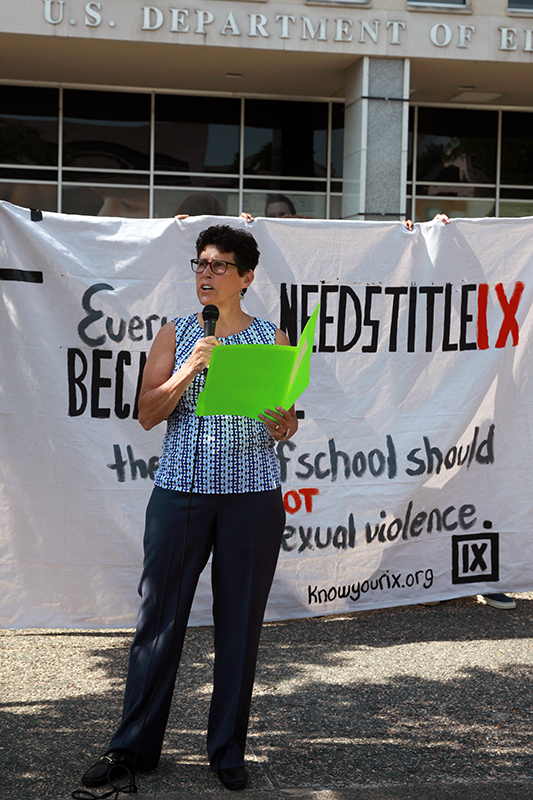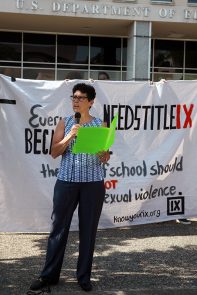Abortion rights, women of color, and LGBTQIA+ people are under attack. Pledge to join us in fighting for gender justice.
Battle-Tested, Experienced, and Determined: An Interview With Civil Rights Lawyer Debra Katz

 Debra Katz, a legendary attorney and expert in sexual harassment, employment, and whistleblower law, is one of the first lawyers who offered to participate in the newly announced NWLC Legal Network for Gender Equity. I had a conversation with her about why she’s fought against discrimination throughout her career, why lawyers are an important part of the resistance, and why she thinks we can win.
Debra Katz, a legendary attorney and expert in sexual harassment, employment, and whistleblower law, is one of the first lawyers who offered to participate in the newly announced NWLC Legal Network for Gender Equity. I had a conversation with her about why she’s fought against discrimination throughout her career, why lawyers are an important part of the resistance, and why she thinks we can win.
Emily Martin: Why did you decide to become a civil rights lawyer, especially focusing on workplace discrimination and sexual harassment? Why are these issues so important to you?
Debra Katz: I decided to become a civil rights lawyer at a very young age because I wanted to make a difference and work to help our society become more just and equitable. I thought being a lawyer would be the best use of my skills and talents – I am a fierce advocate for the underdog and, according to my parents, innately argumentative. Focusing on workplace discrimination and sexual harassment was an easy career choice. Women are drastically underpaid, denied jobs and promotions, routinely discriminated against because of pregnancy and their care-giver obligations, subjected to sexual harassment and other abuses in the workplace and in our schools and college campuses. This, of course, is just a short list. Until these practices are eradicated, not only are the individual girls and women impacted directly but our society as a whole suffers. Over the last three decades, I have had the privilege of representing women who have stood up to discriminatory practices; rejected sexual advances from their supervisors; reported wage discrimination and other illegalities – and I have found that this work is not only critically needed but is also professionally and personally very gratifying.
In 1985, I had a Women’s Law and Public Policy Fellowship – which was a program established by Marcia Greenberger, Judy Lichtman, Eleanor Holmes Norton, and other women’s rights lawyers – to train a group of feminist lawyers with the expectation that post-fellowship we would continue with this vital work. I had the extraordinary opportunity to work with women’s rights attorneys, spear-headed by the NWLC, on the landmark sexual harassment case that went before the U.S. Supreme Court. We won the Meritor Savings case 9-0, due, I believe, in large part to the strategic way that the women’s legal community framed and argued the issues. This was a life-defining opportunity. I have handled many hundreds of sexual harassment cases since that time – and have obtained multimillion-dollar verdicts in several sexual harassment cases. Helping women who have been discriminated against not only stand up for their rights but secure legal victories is empowering for all of us.
EM: I too was a Women’s Law and Public Policy Fellow and concur that it was a life-defining opportunity. Today, in your practice, have you noticed an increase in these kinds of cases or complaints? Why do you think that is?
DK: Unfortunately, these kinds of cases do not go away. In times of economic uncertainty when people feel vulnerable on many levels, it is easy for them to blame other “outside” groups, including women, African-Americans, and national origin minorities, for their lost opportunities. Part of President Trump’s appeal is apparently that he reinforces those fears and resentments. We are seeing a large uptick in sexual, racial, and religious harassment cases since the election. Unfortunately, President Trump’s misogynistic, anti-immigrant, anti-Muslim conduct and comments have radically lowered the bar and have normalized abusive and assaultive conduct in the workplace.
EM: What made you interested in joining NWLC’s Legal Network for Gender Equity?
DK: The need for lawyers to support the work of mission-driven, social justice groups has never been more urgent. This administration’s explicit agenda is to wage an assault on our most basic rights – from reproductive rights to our rights to fair pay. NWLC has fought for these rights for over four decades and has secured crucial legal victories even in repressive times. NWLC has the experience to lead the charge in the days ahead and members of the private bar, who have always looked to the Center for its subject matter expertise, must now contribute to the Center’s efforts to ensure that those facing sex discrimination and sexual harassment have the information they need to connect with legal help. Now that the U.S. Department of Education’s Office of Civil Rights has demonstrated a blatant disregard for the rights of survivors of sexual assault on college campuses, for example, we must turn to the courts to seek justice on their behalf. I look forward to being a part of NWLC’s Legal Network because I want to make myself available to bring lawsuits, when necessary, to hold educational institutions accountable and to provide a measure of justice for these individuals at a time when the Trump administration has made clear that it will not.
EM: As an attorney, how can you best help someone who is experiencing discrimination?
DK: By listening carefully to what has occurred to that individual and to what she needs to be made whole. And then by fighting like hell for her, using whatever resources are needed – including intervening with a discriminating employer, filing charges with federal and state EEO agencies, seeking media scrutiny, and where appropriate, filing suit in court.
EM: What gives you hope in this moment when civil rights enforcement and protections are so at risk?
DK: I am hopeful that we will get through this period in even stronger shape because we recognize what’s at stake and we are determined to resist – fiercely and strategically. I have hope because many of us are committed to aggressively opposing all efforts to strip women and girls of our rights. The women’s march gave me hope; the organizing efforts of individuals throughout the country; the protests and the coming together of different groups and constituencies all give me hope – we the people give me hope. And working with organizations, like NWLC, that are battle-tested, experienced, and determined gives me hope that we will come out of this horrific period with fewer losses than we now fear but with resolve and fight in our bellies. There is no question in my mind that we will have important wins during these dark times.
Recognized as “Civil Rights Lawyer of the Year” for Washington, D.C. by Best Lawyers in America for 2018, as one of the “toughest” employment lawyers in Washington, D.C. by Washingtonian magazine, and as an expert in sexual harassment, employment, and whistleblower law by The New York Times, The Washington Post, TIME magazine and others, Debra S. Katz has been successfully litigating employment discrimination, civil rights, and whistleblower protection cases for over 30 years.
